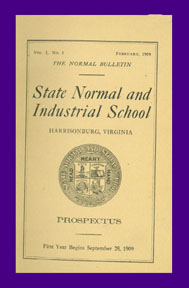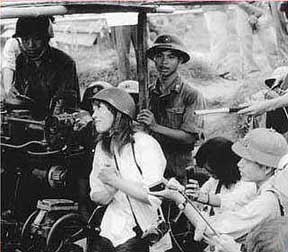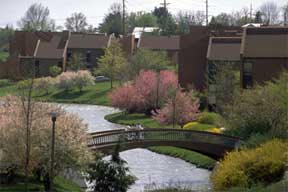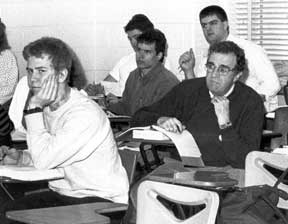
1909
The school's first publication was its catalog, The Normal Bulletin, which appeared in February. The first volume was a 112-page prospectus for potential students, with a wide range of information about the new school to the public for the first time.
Also during February, the school's first motto was established: “That our daughters may be as cornerstones, polished after the similitude of a palace.” The motto would be retained until the fall of 1951 when it was dropped due to the rising number of male students attending the school.
1913
At around 6 a.m. on February 14, student Lillian Campbell sneaked out of her first floor bedroom window in Dormitory No. 2 (Ashby Hall) by means of a bedsheet rope and ran off with her fiancé to be married in Washington D.C. Campbell was expelled from the school for leaving without permission, and the incident made headlines around the state.
1914
On the night of February 15, a 13-by-5 foot hole opened up in the dam of the city's hydro-electric plant, causing the dam to burst. Since the plant, located on the Shenandoah River, was Harrisonburg 's only source of power, the school was without electricity for nearly a month, leading students to dub the period “The Dark Age.”
1916
Virginia Governor E. Lee Trinkle signed Senate Bill 121 on February 13 designating the state's four normal schools as state teachers colleges. The school in Harrisonburg became the State Teachers College at Harrisonburg.
1938
On this date, Senate Bill No. 14 was passed by the Virginia General Assembly on February 17 authorizing the State Teachers College at Harrisonburg to change its name to Madison College, after the nation's fourth president, James Madison.

1939
During the institution's early years, sororities and secret student societies were not allowed. One of the first regulations adopted by the faculty in September 1909 was that no secret student organizations would be tolerated. It would take three decades before this sentiment would change and permission for the student body to establish sororities was granted by the faculty on February 14. The first sororities, Sigma Sigma Sigma and Alpha Sigma Alpha, were granted charters in May of that year.
1968
On February 28, the State Council of Higher Education authorized Madison College to offer the degree of Master of Arts with a major in history. The degree would first be offered during the upcoming fall semester, but students were allowed to begin work on the degree in the summer of 1968.
1969
A PBX telephone system was installed in the basement of Wilson Hall on February 25 to offer phone service to every room on campus. Students would now have private telephones in their dorm rooms. The cost for the new telephone service was added into tuition charges, forcing each student to pay an extra $1.50 per month.

1971
Jane Fonda, controversial Oscar-winning actress and political activist, appeared in Wilson Auditorium in front of a sold-out crowd on February 13, delivering a speech on issues ranging from G.I. rights and the Vietnam War to oppression in India.
1976
Taking an idea from a competition held in Chicago which lasted for four days, the first Madison College Kiss-Off was held on February 7 in the Weaver Hall recreation room. Couples had to be standing with their lips touching at all times and were given only five minutes of rest for each hour they lasted. The grand prize for the winning couple was $30.

1978
New dorm units were completed on the east side of Newman Lake on February 28. Housing applications could be submitted by any student organization but only Greek organizations applied. What was then known as Greek Row opened with 15 Greek organizations in place. The housing units are known as the Tree Houses.
1983
Twenty inches of snow had fallen in Harrisonburg by February 11, forcing President Ronald E. Carrier to announce at 10 a.m. that all classes were canceled. It was only the second time in its history that the university had been shut down because of snow, and the first cancellation since 1962.

1984
JMU Today, a show produced by students, debuted in a live broadcast on cable Channel 8 on February 8. The show, intended for viewing by other students, was divided into three segments: news, sports, and “Around Town,” a calendar of community events and featured stories.
1986
JMU's first-ever student phone-a-thon ended on February 6 as student volunteers phoned parents and alumni for private contributions to the university. The group raised $68,000, just shy of its $70,000 goal, but still an impressive amount for the support of academic and athletic programs.
On February 20, Mr. Chips and the campus bookstore removed all Tylenol capsules from their shelves after a woman in Peeksill, N.Y. died from cyanide-tainted capsules. Johnson & Johnson announced that it would no longer produce over-the-counter capsules because it could not ensure consumer safety, but instead Tylenol would be available in caplets, which were oval, coated tablets not as susceptible to tainting.
1988
The entire Sigma Phi Epsilon house had to be evacuated around 7:30 p.m. on February 15 because two of its members mixed toilet cleaner and ammonia to clean the second floor bathroom of the fraternity house. The mixture of the two chemicals produced a white haze and harmful vapors which Alan MacNutt, chief of campus police, likened to a tear gas attack.

1989
On February 23, President Ronald E. Carrier became “Student For a Day” and freshmen Kimberlee Osborne became “President for a Day.” Carrier and Osborne switched roles after Sigma Pi fraternity sponsored a “President for a Day” raffle to raise money for a scholarship fund in honor of Patsy Graham, a Sigma Pi little sister who had died of cancer the previous November. Osborne won the raffle and took command of the university for a day, while President Carrier attended Osborne's 11 a.m. art class and 1 p.m. English class, and even trekked across campus from Anthony-Seeger Hall to the Convocation Center, just to see how long the walk would take.
